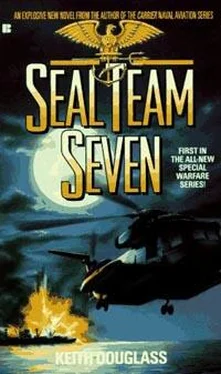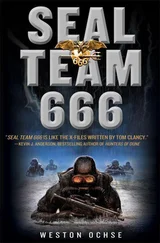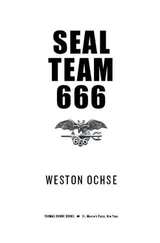Keith Douglass - Seal Team Seven
Здесь есть возможность читать онлайн «Keith Douglass - Seal Team Seven» весь текст электронной книги совершенно бесплатно (целиком полную версию без сокращений). В некоторых случаях можно слушать аудио, скачать через торрент в формате fb2 и присутствует краткое содержание. Жанр: Боевик, на английском языке. Описание произведения, (предисловие) а так же отзывы посетителей доступны на портале библиотеки ЛибКат.
- Название:Seal Team Seven
- Автор:
- Жанр:
- Год:неизвестен
- ISBN:нет данных
- Рейтинг книги:3 / 5. Голосов: 1
-
Избранное:Добавить в избранное
- Отзывы:
-
Ваша оценка:
- 60
- 1
- 2
- 3
- 4
- 5
Seal Team Seven: краткое содержание, описание и аннотация
Предлагаем к чтению аннотацию, описание, краткое содержание или предисловие (зависит от того, что написал сам автор книги «Seal Team Seven»). Если вы не нашли необходимую информацию о книге — напишите в комментариях, мы постараемся отыскать её.
Their cargo includes two tons of weapons-grade plutonium. And now, with enough nuke fuel to arm a superpower, an alliance of fanatics threatens to poison a continent.
In a daring mission of high-seas heroism, Lt. Blake Murdock leads his seven-man unit from Team Seven's Red Squad into bulkhead-to-bulkhead battle — with high-tech
buccaneers who've got nothing left to lose...
Seal Team Seven — читать онлайн бесплатно полную книгу (весь текст) целиком
Ниже представлен текст книги, разбитый по страницам. Система сохранения места последней прочитанной страницы, позволяет с удобством читать онлайн бесплатно книгу «Seal Team Seven», без необходимости каждый раз заново искать на чём Вы остановились. Поставьте закладку, и сможете в любой момент перейти на страницу, на которой закончили чтение.
Интервал:
Закладка:
Too, there were the political problems that buzzed around the stuff like flies over garbage. A sizable percentage of Japan's home population resisted any manifestation of nuclear power, for obvious reasons, and the outcry from environmentalists and anti-nuclear activists around the world had been startling. Transporting so much plutonium was perceived as an unacceptable risk, one threatening thousands, even millions of people, should something go wrong.
Nor was breeder technology proven. Monju, a prototype breeder reactor, was still a year away from producing electricity. America, France, Great Britain, and the other major industrial powers had long ago abandoned the breeder concept as too risky for commercial use.
The creation of so much plutonium had proven to be a public relations nightmare for Tokyo, but there was no other way for the country to achieve its goals. Suggestions from the international community that Japan use plutonium extracted from the post-Cold War world's nuclear stockpiles instead of shipping it halfway around the world was no solution at all, since something still had to be done about all that plutonium piling up in Europe. Besides, the Japanese public insisted, understandably if somewhat irrationally, that only plutonium that had never been used in nuclear weapons was acceptable as a power source at home.
Fears of what would happen if Japan's plutonium stockpiles at home or abroad fell into the wrong hands dogged the nation like a shadow. Anti-nuclear groups were swift to point out that while a serious malfunction in a conventional reactor could lead to meltdown and the release of radiation, a disaster in a breeder plant could result in a very large bang indeed.
Since the United States had sold the original nuclear fuel to Japan, Washington, under the provisions of the nuclear nonproliferation treaty, maintained a say over what happened to it and how it was handled. Unfortunately, the U.S. government was far more sensitive to pressure from the environmentalists Japan than Japan was. A 1989 plan to fly the plutonium back to had been vetoed outright by the U.S., which dreaded the political, ecological, and literal fallout of a plane crash.
The ideal, of course, would have been to process the original spent fuel cores at home, in Japan, but the first such reprocessing plant, now being constructed at Rokkasho, in northern Japan, was not due to begin operation until 1997, and would only have an output of five tons of plutonium a year. Besides, Britain and France had already served notice that they would not store Japan's accumulating stores of plutonium indefinitely. The stuff was difficult to keep, took up a lot of space, and provided a dazzling target for terrorists and activists of any of several political persuasions.
And so, the only alternative for Japan, hedged in by a bewildering array of political threats, treaty and constitutional obligations, and public relations problems, had been to transport the stuff back to the home islands by sea. Tokyo had consulted with Washington on the operation and accepted the American directives regarding security. These had included the structural upgrades to the freighters, the addition of an onboard security force, and the building of the Shikishima herself, since Japanese naval vessels were not allowed to leave their home waters.
The first shipment of 1.7 tons had left Cherbourg early in October of 1992, arriving without incident in Tokai fifty-eight days later. Several shipments had made the passage since, the start of the biggest sea lift of plutonium in history. The timetable ultimately called for a total of some ninety tons of plutonium to be shipped from Europe to Japan by the year 2010. Koga wondered if his government was tempted by so much plutonium to abandon its stance of nearly fifty years and become a nuclear power. The idea didn't bother Koga as it did many of his countrymen; he didn't remember Hiroshima, and as Japan became increasingly isolated in a hostile world, it would have to learn to protect itself, without relying on the vacillations of a fragmented and unreliable West.
In the meantime, it was enough to carry out his duty, which was to deliver two tons of plutonium safely to port in Tokai.
Raising his binoculars to his eyes, he scanned an empty horizon for a moment, then turned them on the lean, white hull of Shikishima, still maintaining station to the north. The Kaijo Hoancho emblem, a triple blue stripe on the hull forward, like a squared-off Roman letter S lying on its back reaching from scupper to waterline, was clearly visible, as were the sailors lounging in the gun tub on the forward deck. They seemed unconcerned about the proximity of Yuduki Maru's cargo.
And in fact, there was little to worry about. The cargo was safely stowed in hundreds of individual lead pigs in the freighter's holds, divided into carefully measured and separated quantities to avoid critical mass and a chain reaction. So far as any external threat was concerned, Yuduki Maru and Shikishima were alone on that wide, empty ocean. The nearest land at the moment was the southern tip of Madagascar, one thousand kilometers to the north, and the weather, a serious concern during the initial planning, was exceptionally and spectacularly calm.
Koga turned his attention to the Yuduki Maru's deck below the bridge. The freighter was designed along the lines of a tanker or bulk carrier, with the blocky, white superstructure far aft, and hold access through deck hatches in the long forward deck. A number of men were visible at the moment, mostly off-duty crewmen basking in the sun. One man, a galley worker, was perched bare-legged on one of the hatch covers, dutifully slicing up vegetables, which he removed one by one from a large sack at his side, and dropping the pieces in a bowl in his lap.
Also visible were five of the ship's security people, wearing brown uniforms and carrying Beretta submachine guns. Yuduki Maru's security force had been drawn from one of Tokyo's Police Special Action Units, again to avoid the restrictions of Japan's postwar constitution. They were the best there was, however, tough, disciplined men who had trained extensively with the British SAS, Germany's GSG-9, and Israeli paratroopers.
There was simply no way any enemy could get at the plutonium in Yuduki Maru's hold. Koga allowed a rare smile to crease his lips. It promised to be an extraordinarily boring voyage.
"Captain!" the helmsman shouted, pointing to port. "Look!"
Koga looked, and had trouble absorbing what he was seeing. A column of water hung suspended at Shikishima's side, descending across her deck like a blanketing mist. In the next instant, the escort vessel seemed to arch from the water like a stretching cat; the thunder of the detonation reached Yuduki Maru a second later, a piercing roar that assaulted the ears and rattled the glass in the bridge windows. Shikishima dropped with nightmare slowness back into the sea, her back snapping as she struck, mingled black smoke and orange flame mushrooming into the sky above her deck.
Koga watched, transfixed, horrified. What was happening? Contradictory thoughts chased one another through his head. The Shikishima's boilers had blown up. She had struck an old mine adrift since some long-ago war. She had been torpedoed. Torpedoed! A second blast tore through Shikishima's stern quarter, hurling fragments — boat davits, life rafts, stanchions, men — hundreds of meters through the air. The Safety Agency's escort could not possibly have struck two mines. Somewhere in that empty sea, a submarine was firing torpedoes at the flotilla!
"Captain!" the helmsman wailed. "What should we do?"
Do? If they stopped to pick up survivors, the next torpedo might well slam into Yuduki Maru's hull, with disastrous results. Indeed, a torpedo might already be on the way, streaking unseen toward the freighter beneath the ocean waves.
Читать дальшеИнтервал:
Закладка:
Похожие книги на «Seal Team Seven»
Представляем Вашему вниманию похожие книги на «Seal Team Seven» списком для выбора. Мы отобрали схожую по названию и смыслу литературу в надежде предоставить читателям больше вариантов отыскать новые, интересные, ещё непрочитанные произведения.
Обсуждение, отзывы о книге «Seal Team Seven» и просто собственные мнения читателей. Оставьте ваши комментарии, напишите, что Вы думаете о произведении, его смысле или главных героях. Укажите что конкретно понравилось, а что нет, и почему Вы так считаете.












